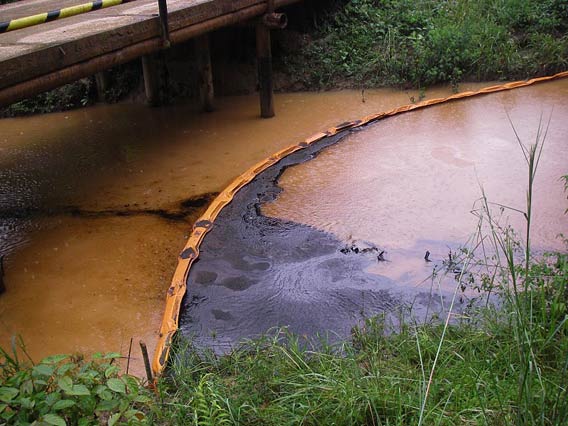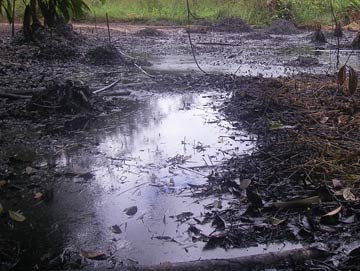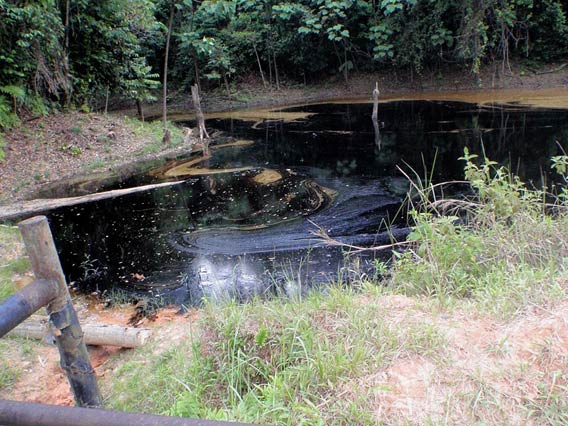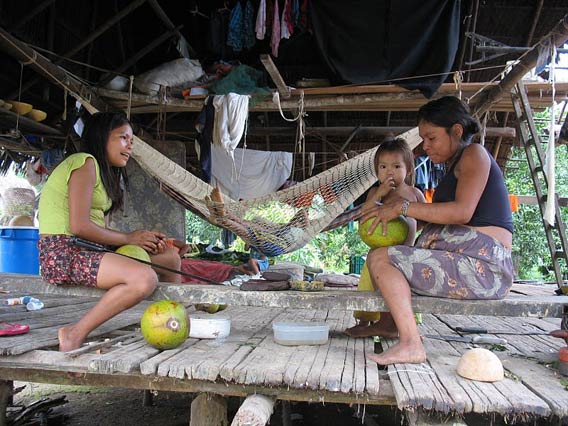
An oil spill flows down Chuuntsa Creek in Oil Block 1-AB. Photo courtesy of: Amazon Watch.
A new report has uncovered 90 oil spills by Pluspetrol in northern Peru’s Amazon rainforest over the past 3 years. Covering two oil blocs—1-AB and 8—the report, complied by the Federation of Indigenous Communities of the Corrientes River (FECONACO), recorded 18 major oil spills in just the last year.
“A week after the landmark ruling against Chevron in Ecuador for $9 billion of
damage from operations in the 1970’s and 80’s, this new report highlights
the ongoing devastation caused by the oil industry on the fragile Amazon
ecosystem and the people that live there,” said Atossa Soltani, Executive
Director at Amazon Watch, in a press release.
In June of last year a tanker spilled 400 barrels of oil into the Maranon River, which led to a blockade where indigenous protested called for Pluspetrol to pay them compensation for the pollution in the form reforestation, food, medicine, and cash payments.
 The impacts of an oil spill in Block 1-AB near the community of Nueva Jerusalem. Photo courtesy of: Amazon Watch. |
Using community monitoring of oil operations along the Corrientes River, the report also documents over 90 contamination sites left from over previous oil operator Occidental Petroleum that were not made apart of a clean-up agreement taken on by Pluspetrol. For its part Occidental Petroleum is currently embroiled in a lawsuit brought to court by members of the indigenous tribe Achuar for contaminating the region.
Peruvian health studies have found that 98% of Achuar children have high levels of cadmium in their blood, and two-thirds suffer from lead poisoning.
“[The report] raises serious concerns about Peru’s aggressive development
strategy to open the Amazon to oil drilling,” said Gregor MacLennan, Amazon Watch Peru Program Coordinator, also in a press release.
The government of Peru, led by President Alan Garcia, is currently pushing an oil boom. Around 70% of the Peruvian Amazon has been opened for oil and gas exploration and drilling, and a number of foreign companies have heard the call, including Talisman Energy, Petrolifera, ConocoPhilips, and Hunt Oil.
The conflict between indigenous people living the region and big oil turned violent in 2009. A standoff between indigenous protestors and government police ended with 23 police officers and at least 10 protesters dead, though indigenous people say that bodies of protesters were dumped in rivers to hide the numbers killed.

A recent spill in a lake in Oil Block 1-AB from August 27 2010. Photo courtesy of: Amazon Watch.
An indigenous monitor documents a new spill in Oil Block 8. Photo courtesy of: Amazon Watch.

An Achuar family in a village nearby oil operations in Block 1-AB. Photo courtesy of: Amazon Watch.
Related articles
Renewed conflict between tribes and oil companies looms in Peru
(01/06/2011) Indigenous peoples and their allies have intensified their fight against two oil companies over contamination in the Peruvian Amazon. Last week, a group of indigenous protesters blockaded portions of the Marañon and Corrientes Rivers in the province of Loreto in northeastern Peru. The protesters were demanding that Pluspetrol, an Argentinean oil company, compensate them for a recent oil spill. As of December 28th, after eight days, the blockade remained unbroken.
50 NGOS tell big oil to get out of uncontacted natives’ territory
(11/21/2010) A letter signed by over 50 NGOs is calling on three big oil companies—Perenco, Repsol-YPF, and ConocoPhillips—to withdraw from Peruvian territory inhabited by uncontacted indigenous tribes. The letter states that the oil companies’ presence in the area threatens the uncontacted tribe with diseases, for which they have little immunity, and puts the lives of oil company workers in jeopardy, since past encounters have ended in violence.
NGO warns oil exploration in Peru may ‘decimate’ uncontacted tribes
(10/17/2010) Survival International has warned that oil exploration in northern Peru threatens two uncontacted tribes. The organization, devoted to indigenous rights, has sent a letter to the UN’s Special Rapporteur on indigenous peoples, James Anaya, alleging that Peru is “violating international law” by allowing oil companies to explore a region home to uncontacted people, who are especially vulnerable to disease.








